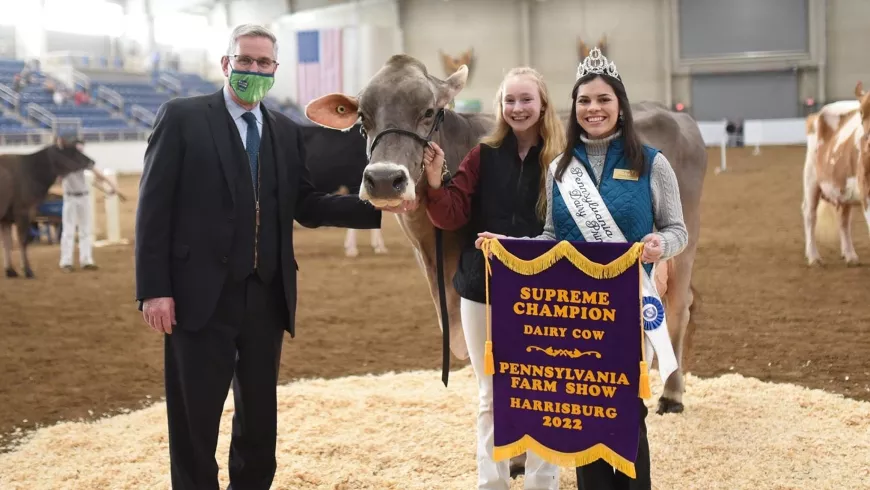100% Online
Complete your Penn State course work at your own pace and 100% online.
Application deadline
Credits and costs
Nationally Recognized

Gain Skills with an Agribusiness Management Degree
Apply contemporary information technology tools, including business software applicable to the field of agribusiness.
Recognize, analyze, and solve issues within agribusiness using quantitative and qualitative measures.
Employ agribusiness concepts and principles to contemporary organizational practices and public policy.
Describe key concepts in agricultural and business management and explain how business management concepts can be applied to manage interactions with other parts of the food system and achieve a competitive advantage in the agricultural business world.
Your Online Agribusiness Management Courses and Specializations
Your Online Agribusiness Management Courses and Specializations
Penn State's online Bachelor of Science in Agribusiness Management program provides an interdisciplinary curriculum that integrates studies in agriculture and business management with courses in finance, supply chain, marketing, and consumer behavior. You can apply the skills you learn directly to the challenges that agribusinesses face today.
Within the agribusiness management degree, you will also select 12 credits in a specialty area that you will choose in consultation with your Penn State World Campus adviser.
The number of credits you will have to take will vary according to the courses you transfer into the business degree program. All students are expected to complete at least 36 credits at Penn State to earn this degree. Once you are admitted into the degree program, an academic adviser will help you determine the remaining requirements.
This course list includes only courses offered through World Campus. An official degree audit or the recommended academic plan for this program may include additional course options and detailed requirements.
Prescribed Courses (37 credits)
- 4credits
Introduction to the role of accounting numbers in the process of managing a business and in investor decision-making.
- Prerequisite
MATH 21 or 1.5 units of high school algebra
- 3credits
Introduction to topics designed to develop an understanding of how the food production, processing, and marketing system works and evolves.
- C or better
A student enrolled in this course must receive a grade of C or better.
- 3credits
Development of quantitative problem-solving skills applied to specific examples of agribusiness management problems, using Excel spreadsheets.
- Prerequisite
AGBM 101; ECON 102; STAT 200; STAT 240; STAT 250; SCM 200
- C or better
A student enrolled in this course must receive a grade of C or better.
- 3credits
Analysis of economic and psychological determinants of the demand for food; marketing decisions in an increasingly consumer-driven food system.
- Prerequisite
(AGBM 101 or ECON 102) and AGBM 102 and AGBM 106
- C or better
A student enrolled in this course must receive a grade of C or better.
- 3credits
Utilize case studies to investigate strategic decision-making among agribusiness firms, highlighting how information and market power shape strategies.
- Prerequisite
AGBM 101; ECON 102, AGBM 102, AGBM 106
- C or better
A student enrolled in this course must receive a grade of C or better.
- 3credits
Understand how prices are determined; develop the skill to analyze and forecast how prices change as the underlying conditions change.
- Prerequisite
AGBM 101; ECON 102, AGBM 102, AGBM 106, SCM 200; STAT 200
- C or better
A student enrolled in this course must receive a grade of C or better.
- 3credits
National income measurement; aggregate economic models; money and income; policy problems.
- 3credits
Writing reports and other common forms of business communication.
- Prerequisite
(ENGL 15 or ENGL 30) and fourth-semester standing
- C or better
A student enrolled in this course must receive a grade of C or better.
- GWS
The credits earned in this course may be applied toward the Writing/Speaking (GWS) requirement.
- 3credits
Nature of finance function; risk and return concepts; working capital; dividend policies; mergers; security markets; acquisition and management of corporate capital; analysis of operations; forecasting capital requirements; raising capital; and planning profits. Available to baccalaureate students only.
- Prerequisite
(ENGL 15 or ENGL 30) and ACCTG 211 and (ECON 102 or ECON 104) and (SCM 200 or STAT 200)
- 3credits
Study of fundamental principles and processes available to the understanding of management.
- Prerequisite
(ENGL 15 or ENGL 30) and (ECON 102 or ECON 104) and (MATH 021 or higher or satisfactory score on the mathematics placement examination)
- 3credits
Covers terminology and important concepts related to marketing in the business environment. Domestic and international environments that impact marketing are included, with particular emphasis on the marketing environment, segmentation, positioning, and targeting. Not available to students who have taken BA 303.
- Prerequisite
(ENGL 15 or ENGL 30) and (ECON 102 or ECON 104) and (MATH 021 or higher or satisfactory score on the mathematics placement examination.)
- 3credits
Supply chain management concepts, principles, and methodologies.
- Prerequisite
ACCTG 211 and ECON 102 and (SCM 200 or STAT 200)
Additional Courses (select 30 credits)
- 3credits
This course introduces students to microeconomic principles in the context of food and agriculture.
- C or better
A student enrolled in this course must receive a grade of C or better.
- or:3credits
Methods of economic analysis and their use; price determination; theory of the firm; distribution.
- C or better
A student enrolled in this course must receive a grade of C or better.
- 3credits
Develop financial management and business analysis skills, integrating previous course work and finance training; principles of financial management, planning, control.
- Prerequisite
AGBM 308W and FIN 301
- 3credits
A problem-based course designed to enhance decision-making skills in the context of industry's approach to developing new food products.
- Prerequisite
AGBM 302 or junior/senior standing in Food Science
- 3credits
Firm management in the food system; coordination with suppliers and customers, including supply chain management, strategic thinking, risk management.
- Prerequisite
AGBM 320 and AGBM 338
- 4credits
Explores the ethical, political, social, legal and regulatory, technological, and demographic diversity environment of business.
- Note
A student may not receive credit toward graduation for both BLAW 243 and BA 243.
- 3credits
The use, analysis, and design of information systems and technologies to organize, coordinate, and inform human enterprises.
- or:3credits
Provides an overview of the role of information systems in business process design; the current technologies used for obtaining, storing, securing, and communicating information in support of operations and decision-making within a business organization; as well as the concepts and principles for developing and using popular spreadsheet and database tools.
- or:3credits
This introductory course spans areas of security, risk, and analysis covering contexts in government agencies and business organizations.
- 4credits
Introduces and develops the mathematical skills required for analyzing change, and the underlying mathematical behaviors that model real-life economics and financial applications. Develops student knowledge of calculus techniques, and how to use a calculus framework to develop critical thinking and problem-solving skills.
- Prerequisite
MATH 022 or MATH 40 or MATH 41 or satisfactory performance on the mathematics placement examination
- C or better
A student enrolled in this course must receive a grade of C or better.
- or:4credits
Introduces and develops the mathematical skills required for analyzing change and creating mathematical models that replicate real-life phenomena. Develops student knowledge of calculus techniques and how to use the calculus environment to develop critical thinking and problem-solving skills.
- Prerequisite
MATH 22 and MATH 26 or MATH 26 and satisfactory performance on the mathematics placement examination or MATH 40 or MATH 41 or satisfactory performance on the mathematics placement examination.
- C or better
A student enrolled in this course must receive a grade of C or better.
- 3credits
The nature and characteristics of human societies and social life.
- 4credits
Descriptive Statistics, frequency distributions, probability and normal distributions, statistical inference, linear regression, and correlation.
- Prerequisite
Placement into MATH 21 or higher.
- C or better
A student enrolled in this course must receive a grade of C or better.
Specialization Courses (select 12 credits)
Select 12 credits in specialty area, in consultation with an adviser. At least 6 credits must be at the 300 or 400 level.
Students often use these courses to pursue their interest in other agriculture-related areas, business and leadership areas, or something completely different. Or you can choose to use these 12 credits toward earning one of the online minors available to complement your interests and strengthen your career aspirations by differentiating your course work.
General Education Requirements
Some General Education requirements may be satisfied by courses required for the major. Students should work with an adviser to select courses.
- Foundations: 15 credits
All courses require a grade of C or better. Inter-Domain courses may not be used for foundations requirements.- Writing/Speaking: 9 credits
- Quantification: 6 credits
3-6 credits are selected from mathematics, applied mathematics, and statistics; 3 credits may be selected from computer science or symbolic logic.
- Knowledge Domains: 15 credits
Inter-Domain courses may not be used for knowledge domain requirements.- Health and Wellness (GHW): 3 credits
- Natural Sciences (GN): 3 credits
- Arts (GA): 3 credits
- Humanities (GH): 3 credits
- Social and Behavioral Sciences (GS): 3 credits
- Integrative Studies: 6 credits
- Inter-Domain course work: 6 credits
- Exploration: 9 credits
- Natural Sciences (GN) (may be Inter-Domain): 3 credits
- GA, GH, GN, GS, and Inter-Domain courses: 6 credits
May include 3 credits of World Language course work beyond the requirements of the student’s degree program or at the 12th credit level, whichever is higher.
These General Education Requirements are for students who started in summer 2023 or later. Students who started earlier can review the prior version of the general education requirements.
Course Availability
If you're ready to see when your courses will be offered, visit our public LionPATH course search (opens in new window) to start planning ahead.
Start or Advance Your Career

Start or Advance Your Career
This degree program and Penn State career resources can prepare you for a challenging and rewarding career in a number of fields, including food production, wholesaling and retailing industries, financial services, agricultural supply logistics, procurement, and input supply. You can also pursue advanced study in business administration, finance, or marketing.
Job Titles Related to This Degree
As the world's population continues to grow, successful production of food and other agricultural products will remain a global issue for many years to come. The Bachelor of Science in Agribusiness Management program can prepare you for a successful business career in industries related to the food system.
The following roles are often held by people with this type of degree:
- Farm Business Management Agent
- Farm Manager
- Field Operations Farm Manager
- Greenhouse Manager
- Nursery Manager
- Ranch Manager
Employment Outlook for Occupational Fields Related to This Degree
Estimates of employment growth and total employment are provided by the U.S. Bureau of Labor Statistics and are subject to change. While these occupations are often pursued by graduates with this degree, individual outcomes may vary depending on a variety of factors. Penn State World Campus cannot guarantee employment in a given occupation.
First-Line Supervisors of Farming, Fishing, and Forestry Workers
Farm and Home Management Educators
Farmers, Ranchers, and Other Agricultural Managers
Career Services to Set You Up for Success

From the day you're accepted as a student, you can access resources and tools provided by Penn State World Campus Career Services to further your career. These resources are beneficial whether you're searching for a job or advancing in an established career.
- Opportunities to connect with employers
- Career counselor/coach support
- Occupation and salary information
- Internships
- Graduate school resources
Upcoming Events
Ready to Learn More?
Get the resources you need to make informed decisions about your education. Request information on this program and other programs of interest by completing this form.
Ready to take the next step toward your Penn State bachelor's degree?
Costs and Financial Aid
Costs and Financial Aid
Learn about this program's tuition, fees, scholarship opportunities, grants, payment options, and military benefits.
Costs and Financial Aid
Undergraduate Tuition
Undergraduate tuition is calculated based on the number of credits for which you register and the number of total credits you have accrued at or transferred to Penn State.
Tuition is due shortly after each semester begins and rates are assessed every semester of enrollment.
2025–26 Academic Year Rates
| How many credits do you plan to take per semester? | If you have 59 or fewer credits | If you have 60 or more credits |
|---|---|---|
| 11 or fewer | $638 per credit | $685 per credit |
| 12–19 | $7,755 per semester | $8,371 per semester |
Undergraduate students taking more than 19 credits will be charged the flat tuition rate plus the regular per credit hour rate for each credit above 19.
Financial Aid and Military Benefits
Some students may qualify for financial aid. Take the time to research financial aid, scholarships, and payment options as you prepare to apply. Federal financial aid may only be used to pay for credits used to satisfy program requirements.
Military service members, veterans, and their spouses or dependents should explore these potential military education benefits and financial aid opportunities, as well.
Additional Cost of Attendance Details
To view the detailed list of cost of attendance elements:
- visit the Tuition Information site
- click the plus sign to expand the table
- select a semester from the World Campus row
Who Should Apply?
This could be an excellent program for you if you already work or aspire to work in the world food system. It's a great match for skills needed in agriculture, forestry, fishing, or food manufacturing, transportation, and storage.
It's also a good choice if you work in businesses such as farm wholesale, grocery, or lawn and garden stores.
Set Your Own Pace

Set Your Own Pace
Whether you are looking to finish your program as quickly as possible or balance your studies with your busy life, Penn State World Campus can help you achieve your education goals. Many students take one or two courses per semester.
Our online courses typically follow a 12- to 15-week semester cycle, and there are three semesters per year (spring, summer, and fall). If you plan to take a heavy course load, you should expect your course work to be your primary focus and discuss your schedule with your academic adviser.
To Finish Your Degree in Two to Three Years
- Take 6 courses each semester
To Finish Your Degree in Three to Four Years
- Take 4–5 courses each semester
To Finish Your Degree in Five or More Years
- Take 2–3 courses each semester
Timelines may vary for students transferring credits from another school or based on course availability.
Convenient Online Format
This program's convenient online format gives you the flexibility you need to study around your busy schedule. You can skip the lengthy commute without sacrificing the quality of your education and prepare yourself for more rewarding career opportunities without leaving your home.
A Trusted Leader in Online Education

Penn State has a history of more than 100 years of distance education, and World Campus has been a leader in online learning for more than two decades. Our online learning environment offers the same quality education that our students experience on campus.
Information for Military and Veterans

Are you a member of the military, a veteran, or a military spouse? Please visit our military website for additional information regarding financial aid, transfer credits, and application instructions.
How to Apply to Penn State

How to Apply to Penn State
Apply by October 31 to start January 12
Application Instructions
Deadlines and Important Dates
Complete your application and submit all required materials by the appropriate deadline. Your deadline will depend on the semester you plan to start your courses.
Spring Deadline
Apply by October 31 to start January 12Summer Deadline
Apply by March 15 to start May 18Fall Deadline
Apply by June 30, 2026, to start August 24, 2026
New students are encouraged to complete the FAFSA by March 1. Please visit the Office of Student Aid website for more information about applying for financial aid and recommended deadlines.
Steps to Apply
To apply for this program, you must be a high school graduate, or have completed your GED.
You will need the following items to complete your application:
High school transcripts or GED transcript — First-year applicants are required to submit Self-Reported Academic Records (SRAR) when applying. Official high school transcripts for first-year applicants will only be required at the time a student accepts an offer of admission to Penn State.
Transfer international students will need to submit their high school transcript before their application can be reviewed.
Official college or university transcripts and/or official military transcripts (if applicable) — All college or university transcripts are required regardless of the length of time that has passed, the grades earned, or the accreditation of the institutions attended. Acceptance of transfer credit toward your degree is subject to final approval by the academic department. For detailed information, see the Transfer Students page.
Transcripts not in English must be accompanied by a certified translation.
English Proficiency — The language of instruction at Penn State is English. With some exceptions, international applicants must take and submit scores for the Test of English as a Foreign Language (TOEFL) or International English Language Testing System (IELTS). Minimum test scores and exceptions are found in the English Language Proficiency section on the Undergraduate Admissions International Requirements page. Visit the TOEFL website for testing information. Penn State's institutional code is 2660.
To begin the online application, you will need a Penn State account.
Create a New Penn State Account
If you have any problems during this process, contact an admissions counselor at [email protected].
Please note: Former Penn State students may not need to complete the admissions application or create a new Penn State account. Please visit our Returning Students page for instructions.
Accessing MyPennState
The MyPennState Portal provides access to our online admissions services. Before accessing MyPennState, you must have a Penn State account that will be used to access all Penn State systems. After creating an account, you will receive a unique Penn State User ID. You will need to enter your User ID followed by @psu.edu when signing in to MyPennState and other Penn State sites. For example, you should be entering something like '[email protected]' in the Sign In field.
The application consists of six sections:
- Application Setup
- Program of Study
- Citizenship and Residency
- Academics and Experience
- Miscellaneous
- Review and Submit
Application Setup
Be sure to select "Online" for the "How would you like to complete your degree" question if you plan to attend Penn State World Campus.
The rest of this section will ask some basic questions about your education experience and military affiliation.
Program of Study
You will choose the degree type and then the starting semester.
Your starting campus will be selected as Penn State World Campus by default as long as you picked "Online" in your Application Setup. Click Continue.
On the Choose a Program page, select your intended major from the list.
Review your selection on the summary screen and click Continue to move on to the Citizenship and Residency section.
Citizenship and Residency
Complete the series of questions about your citizenship status, demographic information, Pennsylvania residency status, and family history.
Academics and Experience
You will need to enter academic experience information about your high school and any attempted courses at a college or university after high school.
The Education Gap Statement offers a place to explain any time that has elapsed between your high school graduation and your anticipated enrollment at Penn State. Please provide a summary of why that gap occurred. Some examples that would explain a gap in your education include work, family, attending another college or university, etc.
Miscellaneous
In the Miscellaneous section, you will provide any program-specific requirements (e.g., a personal statement), information about activities, and financial aid information.
Review and Submit
Review your information, digitally sign your application, and provide payment for the application fee ($65 domestic or $75 international).
High School Transcripts and Academic Record
After your application is completed, you will also need to self-report your high school course work before the application deadline. You will be directed to fill out the Self-Reported Academic Record (SRAR). It is helpful to have a high school transcript available when completing this section. In the third section, you'll select your program of study and campus.
Official high school transcripts or GED transcript, along with records from high school, are required, regardless of the length of time that has passed.
Include any college/university transcripts (required), military transcripts, and Proof of English Language proficiency (if applicable). SAT/ACT scores are not required if you are identified as an adult learner or transfer student.
All official documents should be sent to:
Undergraduate Admissions Office
The Pennsylvania State University
201 Shields Building
University Park, PA 16802You can also have your transcripts sent electronically through Parchment, eScript-Safe, or the National Clearinghouse directly to Penn State from the college/university where course work was attempted.
Acceptance
After receiving your application, application fee, and all required materials, your application will be evaluated for admission. You can check your application status online. This will provide the most up‐to‐date information about the status of your application and is updated once daily, before 8:00 a.m. (ET). Once a decision has been made regarding your application, it will be available to you through the MyPennState portal.
For information on when you can expect an admissions decision, visit the Dates and Deadlines page of the Undergraduate Admissions website. Make sure you click the "+" sign to see these dates for World Campus Applicants (First-Year and Transfer).
5. Complete the application.
Admissions Help
If you have questions about the admissions process, contact an admissions counselor at [email protected].
Contact Us

Contact Us
Have questions or want more information? We're happy to talk.
To learn more about the Bachelor of Science in Agribusiness Management, please contact:
World Campus Admissions Counselors
Phone: 814-863-5386
[email protected]
Learn from the Best
Learn from the Best
The Bachelor of Science in Agribusiness Management program, offered in partnership with the Penn State College of Agricultural Sciences, is developed and taught by experienced Penn State faculty with diverse backgrounds.
Faculty
C. Daniel Azzara
- DegreePh.D., Food Science, Penn State
- DegreeM.S., Food Science, Penn State
- DegreeB.S., Science Education, Virginia Tech
Dr. C. Daniel Azzara is the Alan R. Warehime Professor of Food and Agribusiness and director of Entrepreneurship and Innovation in the College of Agricultural Sciences. Prior to this role, he spent more than 25 years in industry and retired as an R&D executive. His work focuses on company strategy, with particular emphasis on new product development and corporate social responsibility.
Rachael Brown
- DegreeM.S., Agricultural Economics, University of Kentucky
- DegreeB.S., Agricultural Economics, University of Florida
Rachael Brown is a part-time instructor for the B.S. in Agribusiness Management. She has worked for the U.S. Department of Agriculture, and she currently works for the United States Coast Guard. She has specialty experience in regulatory, production, and environmental economics as they relate to agricultural economics.
Kyle Hoy
- DegreePh.D., Agricultural, Environmental, and Regional Economics, Penn State
- DegreeB.A., Economics, Lebanon Valley College
Dr. Kyle Hoy studies the effects of shale gas development and resource taxation.
Jonathan Tuthill
- DegreePh.D., Agricultural Economics, Penn State
- DegreeM.S., Agricultural Economics and Operations Research, Penn State
- DegreeB.A., Economics, Dickinson College
Dr. Jonathan Tuthill is a senior instructor as well as the lead faculty member for the B.S. in Agribusiness Management program. He is interested in agricultural risk management issues and all types of quantitative analysis as it applies to agribusiness management.
News


